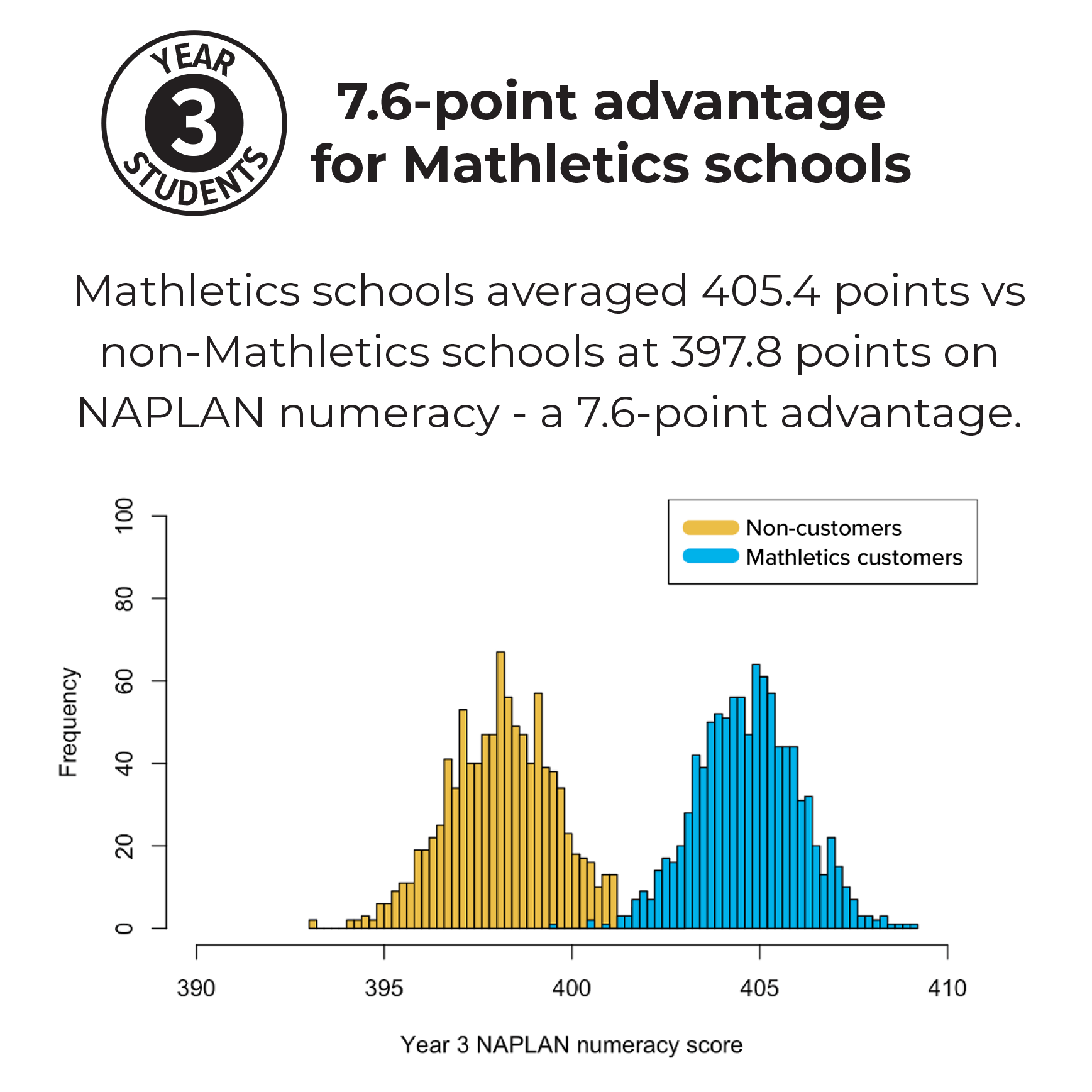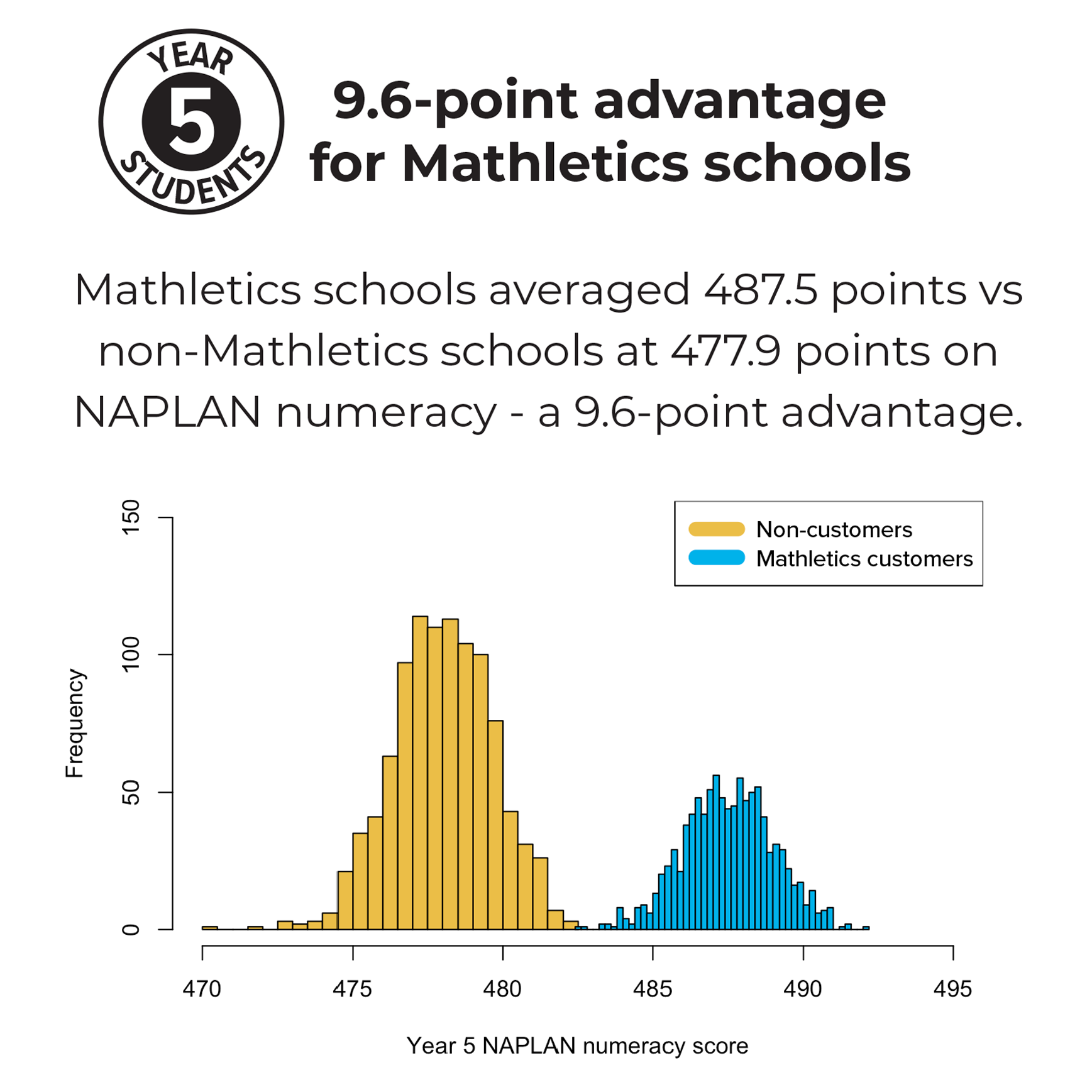Right now, one in three Australian students is failing to meet basic mathematics benchmarks.
For teachers, this isn’t just a number on a report – it’s about real students who risk falling behind in skills that shape their future learning.
But what if we could reverse this trend and empower students to actively enjoy and excel at maths? Brand-new findings from a recent NAPLAN study suggest we can.
The study revealed a direct link between the use of Mathletics and improved student performance on national numeracy assessments.

The research is clear: Mathletics schools outperform non-users on NAPLAN numeracy
New research using 2024 NAPLAN data for Years 3 and 5 shows an irrefutable trend: students in schools that use Mathletics consistently outperform those who don’t.
Further, the difference in maths results between Mathletics and non-Mathletics schools was consistent across schools and year levels.
The comprehensive study, conducted using data from the Australian Curriculum, Assessment and Reporting Authority (ACARA), analysed Mathletics and non-Mathletics schools to examine the relationship between Mathletics usage and NAPLAN numeracy results.
The results are compelling:
-
Year 3 students using Mathletics scored 7.6 points higher than their peers.
-
Year 5 students using Mathletics scored 9.6 points higher – the equivalent of around one term of additional progress.
-
Just 15–30 minutes per week on Mathletics delivered measurable improvements.
-
More use of Mathletics led to greater gains. High-engagement students saw up to 89-point lifts.
The research showed that even minimal use of Mathletics delivers a measurable impact. Below, we dig deeper to see exactly how different ways of using Mathletics affect the results.

Beyond a small sample: analysing the complete national NAPLAN dataset
Unlike many studies that rely on a small, hand-picked selection of schools, the recent report uses the complete national NAPLAN dataset from ACARA, which includes every government, Catholic and independent school across Australia.
This comparative study analysed 2024 NAPLAN numeracy data using bootstrapping techniques with stratified sampling across government, Catholic and independent sectors.
The analysis employed robust statistical methodology to eliminate potential bias and provide reliable conclusions.
Importantly, the scope of this research sets it apart from typical education technology studies. Rather than relying on small samples, this analysis drew from the complete ACARA dataset, ensuring representative findings across Australia’s diverse school landscape.
The study examined Mathletics usage data from June 2023 to February 2024, covering seven months of active school terms leading up to the 2024 NAPLAN assessments.

Year 3 Mathletics users outperform peers by 7.6 points
The data reveals compelling evidence for Mathletics’ impact on Year 3 students, with participating schools achieving meaningfully higher NAPLAN numeracy scores.
Key finding: Mathletics schools achieved higher NAPLAN numeracy scores, averaging 405.4 points compared to 397.8 points for non-Mathletics schools.
This represents a 7.6-point advantage for schools using Mathletics compared to those not using the program.
The consistency of these results across multiple sampling iterations indicates this isn’t a statistical anomaly – it’s a systematic pattern suggesting real educational benefits for schools implementing Mathletics.

Even stronger results in Year 5: a full term of progress gained
Even more encouraging, the research shows that Mathletics’ benefits are more pronounced with older students.
Key finding: Year 5 students in Mathletics schools achieved even stronger results, averaging 487.5 points compared to 477.9 points for non-Mathletics schools.
This represents a 9.6-point advantage for schools using Mathletics compared to those not using the program. That’s the equivalent of around one term of additional progress.
The Year 5 results demonstrate substantial educational impact, confirming the meaningful benefits of Mathletics’ curriculum-aligned approach across different year levels.

Big gains, small commitment: 15 minutes of Mathletics a week delivers measurable NAPLAN improvements
One of the most encouraging findings concerns time investment. The research reveals that students don’t need hours of additional mathematics practice to see meaningful improvements in NAPLAN performance.
Key finding: Students who used Mathletics for just 15–30 minutes per week achieved significantly higher NAPLAN scores compared to non-users.
This finding underscores a critical point for teachers and school leaders: Consistent, meaningful engagement with Mathletics drives measurable outcomes.
More use = greater gains: high-engagement students saw a massive 89-point increase
While even minimal usage shows benefits, the research reveals something particularly interesting about usage patterns.
Among Mathletics users, students with higher weekly usage achieved significantly better NAPLAN results than those with lower usage.
Key finding: Increasing usage from 15 to 30 minutes per week led to an additional boost in scores, with high-engagement students seeing up to 89-point lifts.
The findings demonstrate the scalable impact of Mathletics: as little as 15 minutes of weekly use yields results, with significant gains observed when students increase their usage to 30 minutes a week.

Why Mathletics works: The pedagogical foundation
The research results reflect Mathletics’ grounding in evidence-based educational approaches.
Several key features contribute to its measurable impact on student outcomes:
- Curriculum alignment and sequential learning
Built for the Australian Curriculum Version 9.0 and aligned to state-specific educational frameworks, Mathletics ensures direct relevance to NAPLAN assessment domains. The program features sequenced questions that enable students to systematically build knowledge and skills, with clear learning progressions from basic concepts to complex problem-solving.
- Differentiated instruction at scale
Self-paced learning allows students to progress through maths concepts after demonstrating competency in previous topics. This individualised approach ensures all students can access appropriately challenging content, whether they need additional support or extension opportunities.
- Immediate feedback and data-backed insights
Students receive instant feedback on their performance, enabling rapid learning adjustments and maintaining engagement through positive reinforcement cycles. Meanwhile, educators access comprehensive reporting that provides insights into class, group and individual student performance, enabling targeted interventions.
- High Impact Teaching Strategies
Mathletics incorporates research-proven High Impact Teaching Strategies (HITS) and explicit instruction methodology. Research from the Grattan Institute confirms that explicit and systematic teaching is the most effective way to teach new maths concepts, involving breaking concepts down into small chunks, explaining them clearly with examples and providing step-by-step instruction: exactly the approach Mathletics employs. This ensures that the program doesn’t just provide practice opportunities, it actively supports effective teaching and learning processes.
“The reason we chose Mathletics and why we’re still using it after all these years is because it gives the opportunity for children to develop their learning in and outside of school and it gives them the chance to really do exactly what the mastery approach is – which is deepen their understanding in different contexts.” – Katie Sarjeant, Year 5 Class Teacher and Maths Lead, Wallace Fields Junior School

Ready to see the difference?
This study shows that consistent use of Mathletics leads to real, measurable improvements in NAPLAN numeracy.
Key takeaways for schools are:
- Start with just 15–30 minutes of Mathletics a week
- Use the insights to target support areas where it’s needed most
- Watch your students grow in confidence and results.
Your students’ success depends on evidence-based teaching, supported by tools that truly make an impact. The research shows Mathletics delivers both.


5 Comments
https://shorturl.fm/sMZ6u
https://shorturl.fm/OuWYa
https://shorturl.fm/e9P5i
https://shorturl.fm/Uwsn8
https://shorturl.fm/pgpQU